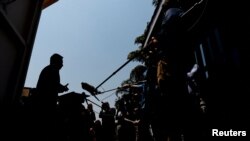The convention was hosted by the Southern Africa Editors Forum (SAEF) and the 16-member Media Liaison Committee in Zambia.
Willie Mponda, chairperson of SAEF, commended Zambia for enhancing media freedoms by repealing restrictive laws like one that penalized defamation of the President and another that imposed the death penalty.
"Over the past year we have witnessed the reopening of closed radio stations and newspapers among other positive media reforms," Mponda said.
Meeting participants discussed favorable working conditions for journalists, including inclusive environments for women media workers.
They also considered the sharing of revenues by digital companies to support ethical journalism and information, the influence of Artificial Intelligence on the media, and a proposal to make press freedom and protections part of the African Peer Review Mechanism.
Chushi Kasanda, Zambia's chief government spokesperson and information minister, emphasized the need for journalists to enjoy their rights as the "the fourth estate" in a democracy – along with the executive, legislative and judicial branches of government.
"Indeed the people of Africa deserve accurate information, they deserve factual information, this is what will empower them to participate in the affairs of their countries and the continent at large, on the other hand the media too deserve freed, they deserve editorial independence they deserve safety to carry out their work," Kasanda said.
Tanzanian Editors Forum Chairperson Deodatus Balile told VOA that there's urgent need to help private media survive harsh economic conditions.
"Most governments are using adverts as weapons to curtail freedom of the press, freedom of the media across the continent. Governments are the main advertisers, and when they withdraw their adverts from private media, automatically they are squeezing them [and forcing them to kneel]," Balile said. "This is an area where we need to have a special eye to make sure the private media industry is devising the mechanisms, looking for new alternative sources of revenue."
African Union head of Communications Wynne Musabayana said the media plays a critical role in a democracy.
"Through its communication policies, strategies and practices, the African Union supports journalists’ rights to seek, receive and impart information. It recognizes that media plays an important role in ensuring the respect of freedom of expression in promoting the free flow of information and ideas in assisting people to make informed decisions and in facilitating and strengthening democracy.”
Africa Media Convention was also held under the auspices of a steering committee and subcommittees drawn from media stakeholders, from UNESCO and the African Union Commission.
The first such convention was held in Arusha, Tanzania in 2022.
